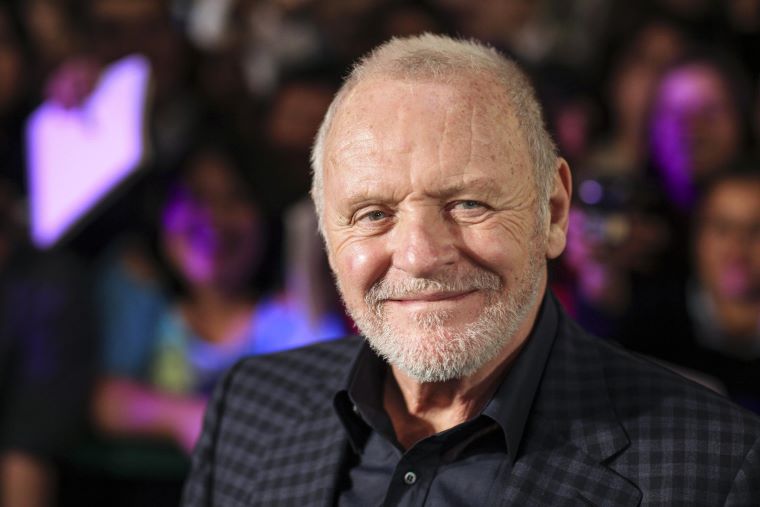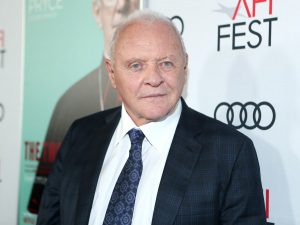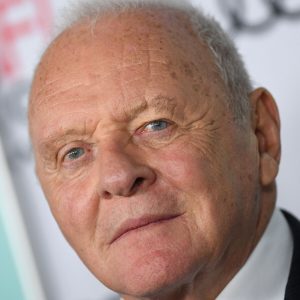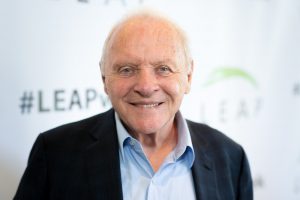
Towards the end of last year, when Anthony Hopkins was promoting his then-imminent movie The Father, Welsh thespian Anthony Hopkins spoke about happiness. In doing so he offered a rich portrait of what it was to be such a man with his talents and achievements in his later years; of who he had been and who he had become; of how he now approaches not only his work, including The Father, but any acclaim which might ensue; of lessons and humility learned as he looked back on a life that was still surging forward.
On Sunday, Hopkins – who turned 83 on the last day of 2020 – became the oldest person ever to receive an Academy Award for acting—his second Oscar—when he was named best actor for his remarkable inhabitation of a man within the oncoming swirls of dementia. But Hopkins was not at the ceremony to receive the award. When he at last felt able to leave home as this pandemic began to ebb, Hopkins had travelled to the places of his childhood in Wales. It was there in Wales, earlier last week, where Hopkins had broken down while reciting Dylan Thomas at his father’s grave; it was there in Wales where Hopkins had been when his award was announced. And it was there too—Wales—where Hopkins’s mind had gone to weeks before, in answer to the very first question we asked him, launching into a series of reflections that somehow managed to seem simultaneously deep, raw, playful, and honest, sounding like a man who had reached a point in his life where he couldn’t be bothered to say anything else other than what he actually thought. That first question was about the time in his life when he had been happiest.
“When I was a boy,” he replied, “Summers in Wales, all that. I used to play ‘round the farms and the fields. This was 1944, 45—at the end of the war years. I wasn’t very happy in school, but I was happy, you know, as a kid. I was a bit of a loner. I used to go off into the fields and up the mountain. And, also, I remember going picking blackberries with my father one Sunday morning. I always remember that.”
What do you think it is about those moments that made them happy?
“The irredeemable past—the past we can never access. We can never go back. The sadness of life is that we go on—we’re born in this world, and at the end we leave, and you think, ‘What was that all about?’ My life… at the end of it all, I don’t know what is… what’s it all about? Is there meaning in it? So, what makes me really happy is—what makes me free I think is the best word to use—is the feeling that nothing is of that much importance. We’re pretty insignificant little dots in our vast universe. I have a saying for myself: Nothing to win, nothing to prove, nothing to win, nothing to lose, no sweat, no big deal. Because there are no big deals—we make big deals of our lives. And that’s the freedom I have, which keeps me… I don’t know if the word happiness is right, but free. Free from worrying about this, that and the other. You know, being significant, all that stuff. It’s okay. You play the game of life upon life itself. But there’s finally nothing to win, nothing to prove, nothing to win, nothing to lose, no sweat, no big deal. And that’s my philosophy. Ask nothing, expect nothing and accept everything. That’s it.”
 A lot of people, obviously, are very invested in everything being very important. Why do you think you feel differently?
A lot of people, obviously, are very invested in everything being very important. Why do you think you feel differently?
“Well, when I was younger, I was ambitious and wanting to succeed. And I don’t think there’s anything wrong with that. [Now] I lean back, and say, ‘Well, you know, I’ve had a great life, I’ve been very fortunate and it’s beyond my imagination where my life has taken me.’ So this is why I can, I think, be relaxed and at peace and just say: ‘Well, do the best you can, do what you can, but it’s no finally big deal because one day we’re all going to be dead.’ [laughs] That’s the truth. The last decade, I think, it came upon me: ‘Oh, come on, just relax, enjoy it, do your job, get on with it. If they want you to work, and if they want to do this, do that, go, show up, learn your lines, and you know, and have some fun with it—don’t take it all so damn seriously.’ Because there’s so many people suffering terrible pain in this world, and loneliness and unhappiness and confusion. And I think, good God, I’m so lucky. You know, I’ve had a great life. You can’t live on a high all the time. You have to live with reality: that life is a battle. Life is painful for everyone, because we’re born and then we suffer grief and loss and finally we have to say goodbye to it all. But for some paradoxical reason I feel okay about that. I think, ‘Oh well, that’s it.’ If anyone wants to give me another job as an actor, I’m 82 now. I’m going to be 83 at the end of the year. And if anyone is foolish enough to give me another part in a film, I’ll do it, show up, make sure my memory is in shape, and I stay fit and well and do the job and don’t take it seriously and have some fun with it, treat people with courtesy and with respect. And that’s what I do. And then the benefits, the reward is terrific, if you just are pleasant to people. Just take it easy. Don’t judge people. I’m not going to judge anyone. And it’s none of my business what people say of me or think of me if even they give me a thought. I do what I do because I like doing it. And my contentment, I suppose, my peace…[laughs] …I like having a cup of tea with my wife. Maybe a couple of cookies or something like that. I play the piano a lot, I paint, I play with my cat, Niblo.”
Those are the things that make you happy in the present day?
“Well, you know, I’ve been in here now for many months in quarantine. And I accept this situation for what it is, think, ‘Well, one day just hopefully they’ll find a way to get through this.’ But I think it’s going to be a reset for the whole of humankind. All this stuff, that turmoil that’s going on, I just think, ‘Well, that’s the way it’s always been.’ Something that keeps me in perspective, actually—and this is a bit deep, I guess—but I was born before World War Two, so I’m an old guy now, so I remember the aftermath of the war, the Second World War. I was then, what? Six, seven years old. So I was old enough to comprehend the devastation of an entire world. I was living in Wales, and the cities around, just west of us, were bombed by the German planes, and London was demolished, Coventry, all the cities, and the devastation in Europe. And I sometimes Google and go back to see the state of Europe, the rubble of Europe just 80 years ago, or 75 years ago—you know, millions of people were destroyed in that confrontation. I mean, 40 to 50 million people, they estimate. I look around, think, ‘Well, yeah, I’ve lived through that.’ I look at our lives now: ‘Well, yeah, this is not good, but we’ve been through worse than this.’ We have been through worse. And I’m not a philosopher, not a sociologist, I’m not a scientist. I have no idea what this is. But people have lived through the influenza pandemic, which killed millions of people in 1919, and the Black Death back in the Dark Ages. And we’ve come through these. You know, the virulent flu in 1957, I was very ill, but I survived that, and thousands of people died in that period, but I survived it. And I think the very fact that I’ve survived gives me a sense of hope. And I try to spread to young kids, to younger people, people who are in my business and struggling. I say, just hang on, just keep going. Just do what’s in front of you, try to do the best you can.”
When were you happiest in the last year?
“Last year [i.e. 2019] I was in England making this film with Olivia Colman called The Father. The last five years have been incredible—I’ve been given some amazing roles to play. I’m pretty lucky. But last year was quite a year because it was a wonderful script by Florian Zeller, who wrote the play The Father, and Chris Hampton. I think that was probably the most exhilarating time I’ve had. It was an easy… it was a painful subject, about dementia, but they were such a great people to work with. I said to Olivia one day, ‘Do they actually pay us to do this?’ You look around, and the life I’ve had in this business, I’m surprised, actually, that they pay me to do what I do, because it’s a lot of fun. And, yeah, if people want to take it very seriously and intensely, that’s up to them. But I’ve done all that in the past and I think, ‘No, I’ll just relax.’ I have learned a few tricks on the way—you know, I’m experienced in my business—and so all I try to spread around me is a bit of peace and respect for people’s other work, and be generous, be kind. And I think that’s a tribute to life itself, really: just be kind to people. You know, just let people be what they are. Live and let live. That’s the thing.”
 Can I ask you this: What does happiness feel like?
Can I ask you this: What does happiness feel like?
“Oh, I don’t know. Just a sense of contentment. I’m not jumping up down all the time but I just mosey through the day and do my painting and play piano. And I get peace when I read. Happiness is a kind of misleading word. You know if I ask, you know, ‘what is happiness?’ Jumping up and down? Well, that’s kind of insanity. Nobody’s like that. We have degrees of uplift, and degrees of sadness, because your life is, it’s sad and it’s also wonderful, because we lose people, we suffer grief. And so to me, it’s just being content with what’s right now…That’s to me happiness: to acknowledge that I know nothing. I’m insignificant. It’s all meaningless to me. And it’s a bit of fun to have a little bit of acclaim and be successful or achieve things—it’s fine. And I’m sure that if I do something else, get another job and I do that okay, I’ll think, ‘Oh, good.’ But finally, at the end of it all… the film I just did, The Father, the last scene is this old guy that I’m playing, he’s come to the end of it all and he’s so confused. And the camera pans past his empty chair in the room and the photograph of himself with his two daughters, and goes out… And the things we have now, like photographs of the past, our family, whatever our collections are, this that and the other, bits and pieces of stuff… and finally, that’s it—bye folks. As Mel Blanc said, ‘That’s all folks!’’ [laughs] I don’t know what my epitaph will be. Probably something like, ‘What the hell was that all about?’ [laughs].”
Are there any works of art that make you happy?
“Works of art? Well, I do a lot of painting. I paint most days and I enjoy my own work. I mean, I’m a bit clueless, I don’t have any training. But I like Van Gogh and the Impressionists—they’re full of life and light. I like those. I’m not an academic, I’m not an aficionado, I don’t know much about art. I don’t. But I don’t know much about anything really. I mean that from the bottom of my heart. I pretend to know—you know, we all pretend that we know. I don’t have a clue about most things. I really don’t. I can’t even use my computer. I really don’t know that much.”
Please allow me to defer judgment on that. I have a hunch you may do.
“I’ll tell you something: many years ago my wife, just before we got married, she encouraged me to paint. She found some drawings of mine, these old scribbles, and she said you should paint. And so I started. An old friend of mine, sadly he died some years ago, Stan Winston, did Jurassic Park, he came over to the house one day, saw some of my paintings on the wall of the studio. And he said, ‘Who did these?’ And I pulled a self-deprecating face, said ‘I did.’ He said, ‘Why are you pulling a face like that?’ And I said, ‘Well, I’ve had no training.’ He said: ‘Don’t. Don’t train— you’ve got it.’ He said,’ I couldn’t paint like that…’— I’m quoting him— ‘…because I’m academically trained.’ And he said, ‘you’re lucky, just paint.’ The same with music: I play piano, and I compose. I’ve no ambitions to be a concert pianist. I play for my own enjoyment. And so I could no more sit in the studio studying an apple or painting a nude…I’m not a good student. I couldn’t sit with the teacher. I can’t bear instruction. I rebel against it. So I’ve always done my own thing. With acting as well— theories on acting, and this that and the other. Sometimes I’ll work with an actor and I’ll say: just do it, stop analyzing it, just get on with it. Enjoy it. Just do it. You can either do it or you can’t. If you can’t, it doesn’t matter. Who cares, finally, in the end?”
Do you think you’re happier than most people or are most people happier than you?
“Oh, I don’t know – I haven’t seen anyone for eight months!”
Well, I have to say: from the very short time we’ve been speaking, I suspect you might be a little happier than most people.
“Well, don’t want to tempt fate. But yes, I look around and I think, what have I personally got to complain about? Nothing. Really nothing at all. And what I think is, well, what surprises me really is: I’m going to be 83 at the end of this year, I’m in good health as far as I know, I’ve been working up till last year. And I think, well… I think the fact that I have survived. And the contemporaries of mine, people I knew years ago in England, and a couple out here, are just gone. They died maybe prematurely, some were severely ill, or, I don’t know, some died quite youngish— you know, died in their 60s or 70s. And I look at my life, I think, ‘Well, I’m on borrowed time and l might as well make the most of it.’ And, as Carl Jung, a great psychiatrist, once said: We go through life, we’re jumping up and down and we’ve got expectations, and then suddenly at middle age, you see on the horizon mortality, you see death waiting, and you either become friends with that idea, accept it and enjoy what it is… It’s a sweet sadness but enjoy it. And that’s what I do.”
 Can someone be too happy?
Can someone be too happy?
“I don’t know. Well, I think you’d become psychotic. [laughs] When I was young, but not that much younger— maybe over 10 years ago, maybe less than that— I had fits of depression and darkness and then I’d be manic. They used to call it manic depressive, now they call it some other fancy name. Bipolar. I don’t know if I was any of those things. But if I’d become too manic, or too boisterous, I’d think, ‘Eh, watch it! Yeah, calm down, calm down. You can calm down in the enthusiasm!’ You have people who are enthusiastic all the time—they’re all up and up and up. I knew one like that, some guy, he had manic energy. Manic energy. And he jumped off a cliff one day. Or jumped from a great height somewhere. And nobody could figure out why… The balance of the mind—I mean, it’s such a dichotomy, isn’t it? It’s such a dangerous area. It’s our friend, and it also can be our enemy, if we listen to the voices. I don’t believe anything I think anymore. I say, ‘don’t believe what you think’, because what I can think sometimes will send me crazy. [laughs] So I think, ‘Come on, switch it off, stop it, stop it, stop it…’ [laughs]”
So overall, how important do you think happiness is?
“Oh, well, if you can find it… look, I can’t speak for anyone else. I can’t. I can only speak for myself. I don’t have any elixir. I don’t have any answers. All I know is that my own unimportance is the thing for me. Is to not take myself so seriously. There was some guy published a book many years ago, quite a thick book, and it was full of empty pages, except the two center pages were Don’t take your damn self so seriously. [laughs] And that was the answer; that was the book. So you’ve got to have a laugh. We have to have a laugh. There was a wonderful film… did you ever see a film with Humphrey Bogart and Walter Huston, it was called The Treasure of the Sierra Madre?”
Yeah. That’s a great film.
“Walter Huston, Tim Holt, Bogart, wonderful actors. John Huston directed. And at the end they go up into the mountains and they slave to get this gold dust, and they get all the gold dust, and they gather it, and one of the guys… Bogart plays the villain, and Bogart tries to steal somebody else’s gold. Finally, he’s killed by bandidos in the desert and they hack his sacks open—they don’t know what it is, it’s just dust. And then the other two guys who have been through this hell, when they find there’s been a dust storm that has blown all the gold back to the mountains, they start to laugh. Walter Huston started to laugh out loud. The story was that they didn’t know how to end the film and—I don’t know if this is probably apocryphal but—I think it was John Huston who said to his father, Walter Huston, ‘Do you remember that time when you did King Lear in New York…?’ And Walter Huston had read the reviews the next day and they were pretty terrible, and John Huston was going to his father’s room at the Algonquin or something, and he heard this laughter. And there were all these papers, and Walter was sort of rolling on the floor, laughing, because of his own ridiculousness. That he thought he could do King Lear! And basically that finally it’s all a big laugh. [laughs] My favorite story is ‘The Appointment in Samarra.’ About the servant who goes to the market to get goods for the caliph, and in the marketplace he sees Death. Death beckons to him, so he gets on his horse and he runs back to his master and says, ‘I saw Death in the marketplace. Can you lend me your fastest steed? I must go off to Samara tonight, to be with my family.” ‘Yeah, go go.’ So the master himself goes down, and he sees Death in the marketplace and goes up to him, and says, ‘You wanted to talk to my servant. What was your message for him?.’ Death says, ‘I just wanted to tell him I’m going to meet him tonight in Samarra.” [laughs]
And what do you think we should take from that story?
“Enjoy it while it lasts. Enjoy it while it lasts. Because we don’t know. We know nothing. And that comes back to me. I know nothing. I don’t know anything.”




















Leave a Comment